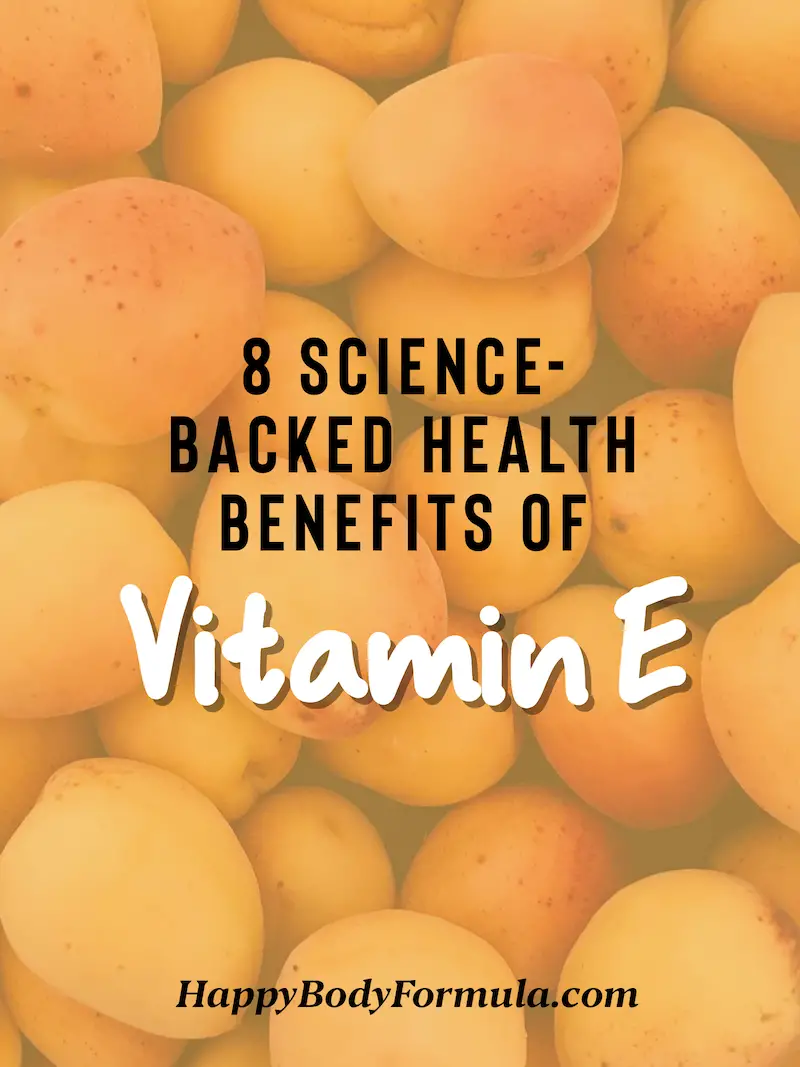
An antioxidant and essential nutrient, vitamin E is beneficial for many aspects of health, including fighting oxidative stress, protecting heart health, supporting skin health, promoting hormone balance, and more.
Most Americans don’t get enough dietary vitamin E, which could be why supplements are so popular.
However, too much vitamin E can also cause problems—as you will learn below.
[toc]
What Is Vitamin E?
Vitamin E is a fat-soluble vitamin that functions as a potent antioxidant in the body. It is naturally found in foods but it also widely available as a supplement.
Antioxidants are necessary because they protect the cells from free radicals, which damage cells and could lead to the development of heart disease and cancer, among other diseases. (source)
We are exposed to free radicals from everyday aspects of life: eating, the environment (like air pollution and secondhand smoke), and UV rays from the sun. There is no way to prevent free radical exposure, which is why it is important to make sure that your body has the tools it needs to help decrease the damage they can cause.
Vitamin E is also an important nutrient for healthy immunity, and it also improves the ability of cells to communicate, for genes to express, and for normal metabolic processes to occur.
Health Benefits of Vitamin E
As you can see, vitamin E has a substantial impact on human health. These are the top research-backed ways that it supports health and promotes wellness.
1. Protects Heart Health
Coronary heart disease is one of the leading causes of death across the world. There is convincing evidence that shows that vitamin E can help to prevent the onset of cardiovascular disease, particularly in middle-aged and older men and women. (source)
Vitamin E can also lower the risk of heart disease by as much as 40 percent when taken in supplement form on a regular basis. It can also reduce the risk of mortality from heart disease. (source, source)
While not every study shows unanimous prevention of heart attack, other studies do associate vitamin E with a 21 percent reduced chance of having heart failure. (source)
It’s important to understand that taking excessively high amounts of vitamin E does not increase the protection, and can actually lead to a risk of hemorrhagic stroke or other bleeding complications.
Always take vitamins as directed. Overall, antioxidants such as vitamin E can protect heart health, but need to be combined in conjunction with other healthy lifestyle factors like a healthy diet, regular exercise, and stress management.
2. Protects Brain Health
Oxidative damage in the brain can increase the risk of Alzheimer’s or dementia and lead to cognitive decline. As an antioxidant, vitamin E can help to protect the brain against the rapid degradation of cells. (source)
Supplementing with vitamin E helps reduce cognitive decline over a three year period in people older than 65. (source)
While all research is not unanimous in vitamin E’s brain benefits, it is recognized as an important nutrient for preventing overall oxidative damage.
Since the brain is particularly subject to this due to lifestyle and environmental exposures, diet, and genetics, it could be a helpful tool in preventing or reducing risk of developing age-related cognitive disorders.
3. Fights Free Radical Damage
Free radicals cause problems beyond heart or brain health. They break down healthy cells anywhere in the body. The results can be as extreme as getting cancer, or to a lesser degree, experiencing inflammation or signs of premature aging.
Vitamin E helps to reverse these oxidative damage effects. (source)
Cancer, while a big scary concept, is actually as “simple” as cells that begin to reproduce incorrectly. They become damaged and the checks and balances that keep cells from taking over become lost.
Cancer can be caused by many things, including genetics, but regular exposure to carcinogens, paired with the body’s inability to handle free radicals, can increase the risk. Vitamin E protects cells from being damaged by free radicals.
It may also help protect against cancer by boosting the immune system. (source)
Most cancer research does not find vitamin E in and of itself to be effective against cancer. But in conjunction with other nutrients it may have a protective effect in certain types of cancer or individuals, particularly those exposed to carcinogenic substances.
One study found vitamin E to reduce the occurrence of prostate cancer by 32 percent compared to those not taking the supplement. (source)
However, other studies have found there to be no difference between vitamin E and placebo.
Another study found that vitamin E can decrease the risk of developing colon cancer, particularly in women who are over age 65. (source)
Ultimately, whether vitamin E is anti-cancer or not depends on the person’s individual genetics and other health factors.
4. Protects the Skin & Promotes Wound Healing
Vitamin E is well-known for having skin benefits. It helps to strengthen blood vessel walls, boosts moisture, and increases elasticity—all of which protect the skin from premature signs of aging.
The main reason that vitamin E has these skin benefits is that it fights inflammation internally and topically. Antioxidants help reduce skin damage over time from things like UV rays, secondhand smoke, and other triggers for skin cancer.
Vitamin E paired with vitamin C, another potent antioxidant, helps address acne and eczema when taken orally.
Not all research points to vitamin E as a skin healer, though. Some studies show it’s not effective for healing scars, as is widely believed, while others show that it is when used on healed but recent surgical scars.
5. Promotes Eye Health
Vitamin E has long been used to support eye health, especially in the context of aging. Age-related macular degeneration, also known as AMD, is one of the primary causes of blindness in older individuals. Typically oxidative stress has been assumed to be a trigger in this process.
Studies have shown that vitamin E intakes within the normal range can lead to a 20 percent reduced chance of developing age-related macular degeneration. (source)
Others have found that vitamin E, paired with vitamin C, zinc, vitamin A, and copper, was able to reduce the risk of AMD by 25 percent over a five-year period. (source)
6. Promotes Hormone Balance & Relieves PMS
Hormone imbalance can lead to significant life alterations and discomfort. Vitamin E has been shown by research to provide a calming and balancing effect on the nervous system and endocrine system. (source)
Common signs of hormonal problems include:
- Anxiety
- Depression
- Skin blemishes or changes
- Weight gain
- Allergies
- Premenstrual syndrome (PMS)
- Fatigue
- Insomnia
- Mood changes or disorders
While there are many other signs that hormones could be off-balanced, these tend to show up frequently, especially in women of reproductive age and menopause.
Vitamin E is especially effective when taken the week leading up to menstruation and two to four days into the new cycle. It can help to calm the nervous system and lead to better balance and could also improve other PMS-related symptoms like cramping, cravings, and stress.
7. Supports Healthy Fertility & Pregnancy
Vitamin E helps to protect a developing fetus during the early days of pregnancy when inflammation could result in developmental problems. It affects neurological development, particularly how the brain forms, first during pregnancy and then into the first few years of their life.
Prenatal vitamins include slightly higher amounts of vitamin E for this reason, to boost the levels of pregnant and breastfeeding women. Many infant formulas also contain vitamin E. Supplementation should be considered as part of a healthy diet for children up to age two.
8. Supports Natural Immunity
Vitamin E isn’t the first nutrient you think of when it comes to the immune system, but as an antioxidant, it has a stimulating effect, primarily in older individuals.
One study found that vitamin E supplementation, especially in older people, was able to reduce the risk of upper respiratory infections, most notably the common cold. (source)
It has also been shown to increase immunity in healthy individuals, too. (source)
Vitamin E could also be helpful in optimizing how the body responds to certain vaccinations. One study showed that it influenced how effectively individuals responded to both hepatitis B and tetanus vaccines. (source)
15 Things Vitamin E Won’t Help With (According to Research)
While vitamin E certainly has many health benefits, claims abound on the internet that it can do more than it has been proven to.
The following are not areas where vitamin E has been proven by research to be helpful: (source)
- Lowering blood glucose levels, insulin, hemoglobin A1c, and treating diabetes
- Reducing the risk of breast cancer
- Increasing HDL or lowering LDL cholesterol levels
- Boosting red blood cells or hemoglobin levels
- Reducing risk of stroke
- Increasing levels of thyroid hormones
- Lowering triglyceride levels
- Promoting weight loss
- Treating asthma
- Reducing cortisol levels
While vitamin E has many benefits, it is not a magic fix, and needs to be consumed in balance with the other essential vitamins and minerals.
Risks of Too Much Vitamin E
While vitamin E can definitely be beneficial in many cases, it’s important not to take too much in supplement form. No risks have been found from consuming vitamin E from foods alone, but high doses of supplements can lead to excessive bleeding and clotting problems, especially when vitamin E is taken together with aspirin. (source)
The upper limit for safe vitamin E intake in adults over age 19 is 1,000 milligrams or 1,500 IU, however several studies find that supplemental vitamin E should max out at no more than 400 IU per day. (source)
Cautions and Who Should Not Take Vitamin E Supplements
Like many other supplements, vitamin E can interact with other supplements or medications. You should always ask your doctor before starting any new supplements to ensure that there will be no interactions or problems.
Vitamin E should not be taken by people who take:
- Blood thinners
- Antiplatelet medications
- Cholesterol medication
- Niacin
Vitamin E is also not safe to be taken during cancer treatments or chemotherapy.
Recommended Daily Intake of Vitamin E
Vitamin E needs are met for most people when they get 15 milligrams or 22.4 IU each day, which is drastically lower than most supplement doses. Children need even less.
The safest way to optimize vitamin E intake might be to focus on eating more foods that contain this antioxidant nutrient.
Vitamin E Foods

There are many food sources of natural vitamin E. These include:
- Wheat germ oil = 1 tbsp, 100% daily value
- Sunflower seeds = 1 tbsp, 37% daily value
- Almonds = 1 ounce, 34% daily value
- Hazelnuts = 1 ounce, 22% daily value
- Spinach = ½ cup, 10% daily value
- Broccoli = ½ cup, 6% daily value
- Mango = ½ cup, 4% daily value
- Tomato = 1 medium, 4% daily value
If you eat a balanced diet and take a multivitamin, odds are you are meeting your body’s basic needs for vitamin E.
Vitamin E Supplements
When does someone need to take vitamin E on its own? Ideally only if directed by your doctor. Since the recommended daily amount is just 22 IU for most adults, it’s possible that regularly taking a standalone supplement could quickly lead to excess vitamin E intake.
Vitamin E supplements come in many types and doses, and it’s crucial to look at the dose you’re taking from all supplements combined. Some antioxidant supplements will also include vitamin E, too. Then, consider how much you’re regularly getting from your diet.
If you need help determining optimal vitamin E intake, consult a nutritionist who can assess your dietary habits. Always keep your doctor informed about the supplements you take and any changes to your routine.
Bottom Line
Vitamin E is a potent antioxidant nutrient that is vital for many reasons. However, it is not needed in high amounts to be effective. Research shows several benefits for it, but there are also some downsides and risks to taking vitamin E supplements.
Make sure that you’ve considered all aspects of your personal health before supplementing with vitamin E on its own and be sure to get your doctor’s feedback before starting it if you already take other medications.

Aimee McNew, MNT, CNTP, is a certified nutritionist who specializes in women’s health, thyroid problems, infertility, and digestive wellness. She ate her way back to health using a Paleo diet, lost 80 pounds, and had a healthy baby after numerous miscarriages. She focuses on simple nutrition practices that promote long-lasting results.

